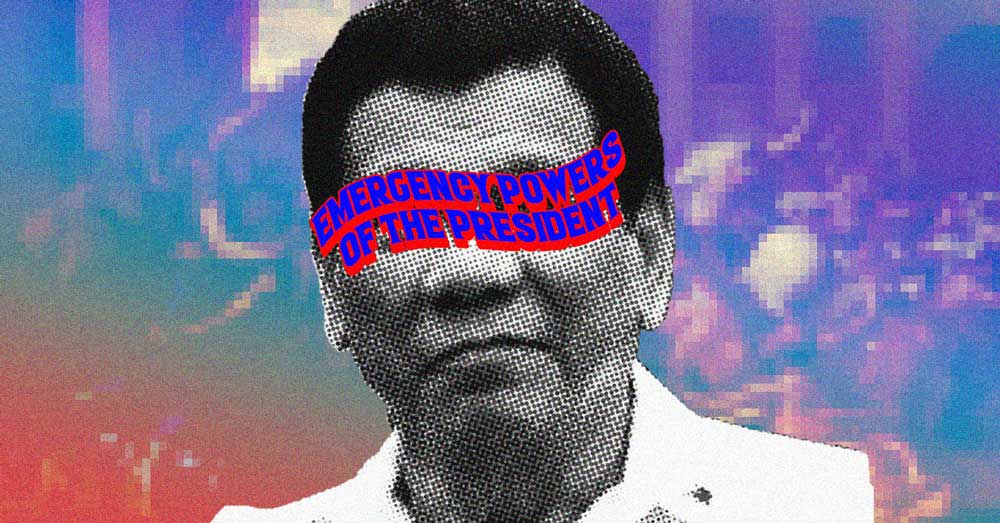What falls under the emergency powers of the president?
Hello, world. This is Adie, coming from the safety of my home and (hopefully) reaching you in the safety of yours. It’s a strange society we live in now, especially since most of us don’t know what the hell is happening and how to respond to it. The only thing we know for sure is: Stay at home, as much as you can.
RELATED: Death by Subtweet: Frankie Pangilinan and Her Dream Meme Revolution
But with this whole work from home situation most of us have going on, there’s a surplus of information we’re all absorbing—willingly or not. It doesn’t help that the news headlines change day after day, with the most recent ones claiming that there’s a motion for Congress to give President Rodrigo Duterte “emergency powers.”
According to Rappler, Duterte signed Proclamation No. 933 on March 21 (Saturday), which called on Congress to hold a special session today, March 23 (Monday). The agenda, of course, is to discuss granting him emergency power on the pretense of then being able to address the nation’s current state. Apparently, giving Duterte “emergency powers” would give him the necessary authority to direct our fragile nation towards a road that resembles survival.
Mhmm, this is not a time for my personal opinions. First things first: What TF does “emergency powers” mean?
RELATED: The PH Mental Health Bill: What It Is & What It Should Do
Look, I’m no lawyer (as hard as my dad tried to convince me to go down that path)—but my brother is. And he says that granting the president “emergency powers” is actually a case-to-case basis. This, one in particular, states the following:
Authority over and control of private businesses
The approval of this specific bill will allow Duterte to “temporarily take over or direct the operation of any privately-owned public utility or business affected with public interest.” The industries particularly noted are hospitality, transportation and telecommunication (on an “including but not limited to” basis).
Hotels might be called on to house healthcare workers or serve as quarantine centers. Alternatively, they might also become makeshift medical relief and distribution centers. Transportation will be used to shuttle the same healthcare workers, as well as emergency and frontline personnel. As you would guess, telecommunications will be controlled so that communication between the government and public stays intact and up-to-date.
Management of businesses and industries will remain within the responsibility of its officers, but Duterte will direct and supervise these operations. Think of him as the new Chief Operations Officer of everything. For example, Duterte declares that all COVID-19 patients will be looked after in Makati Medical Center; MMC will have to do so—but still under MMC’s protocols.
Next.
A major reallocation
Should it be approved, the bill that grants Duterte with “emergency powers” also has provisions for budget and service reallocation. That could mean cancelling some programs and projects to further fund the fight against COVID-19, or the redistribution of things like power, fuel, energy and water. So if the president decides that one project is no longer a priority, then he can veto the same and quickly get the budget for the cancelled project to finance COVID-19 efforts, whatever they may be.
Build, build, build. Buy, buy, buy
The bill will also allow Duterte to buy goods, such as testing kits, without having to go through the standard operating procedures of procurement. Plus, he’ll also be able to lease properties and construct temporary medical facilities—also without having to go through standard procedures. Businesses might also be required to prioritize anything COVID-19 related, whether for material production/supply or for services.
You see, if things were under normal circumstances, anything that involves the use of government funding would have to go through bidding procedures—which could take quite a while—to help ensure that there is no favoritism or corruption.
RELATED: What Shoulda, Woulda, Coulda Been: A Tribute to the Late Miriam Defensor Santiago
If I’m being honest, it all sounds pretty basic and necessary, yes? Yes, we’re cutting some things out of the equation, but if we’re in a state of national emergency, doesn’t it only make sense for the government to have free rein on what to do? On paper, it sounds like the public’s interest is at heart—but we all have our opinions on that; for this and for the time being, my feelings and thoughts will remain personal. The goal right now is to educate and not to sway.
Plus, a little disclosure: As of this writing, President Duterte has not been granted his emergency powers just yet. There are two versions of the bill currently under review; one is with the Senate and one is with the House of Representatives. Together, these government bodies need to jointly approve the bill in a 2/3 majority vote. But if there are two versions of the same thing being reviewed, how TF are our officials to properly vote? Apparently a small committee will be formed (maybe later today) to properly consolidate the two bills.
And another thing: The House and the Senate do have the authority to waive certain sections of the bill. It is not an ultimatum and we are not under a state of lawlessness. So panic or no panic, now is not the time to jump to conclusions. But it is a time to hope that the right outcome comes our way.
Art Alexandra Lara


















